The <I>Odyssey</I> Read online
Page 9
He claims to be Mentes; he calls Ankhialos father,
a wise man. He rules the Taphians, lovers of rowing.”
Still Telemakhos knew in his heart Mentes was deathless.
420
A New Day Ending
Others went back to their pleasures—spirited singing
and dancing a while—they stayed till evening’s arrival
entertaining themselves. With darkness approaching
they left to take some rest, each man to his own house.
An Old and Caring Nurse
Telemakhos’s room was raised over the handsome
courtyard, built up high, a place with a broad view.
He went there now, pondering all of his troubles.
A caring Eurukleia joined him and carried
the blazing torches. The daughter of Ops, a son of Peisenor:
Laertes had bought her once with a lot of his own wealth,
430
paying twenty oxen—the woman was young then.
He honored her much as his caring wife in the great hall,
but not in his bed: he avoided vexing his lady.
She carried the blazing torches now for she loved him
more than the other maids—she’d nursed him in childhood.
After she opened the doors of his well-fashioned bedroom
he sat on the bed, took off his tunic, a soft one,
and placed it right in the knowing, elderly woman’s
hands. She folded and smoothed it, hanging the tunic
high on a peg close to the hole-and-cord bedframe.
440
Then she went from the room, closing the door with its silver
handle, pulling the thong and driving the bolt in.
All night long he stayed there, wrapped in a woolen
blanket and pondering moves laid out by Athene.
BOOK 2 A Gathering and a Parting
Summoning the Old and Young
When newborn Dawn came on with her rose-fingered daylight,
the well-loved son of Odysseus rose in his bedroom
and dressed. He hung a sharp sword from a shoulder,
strapped two beautiful sandals under his oil-smooth
feet and left the room, his face like a great God’s.
He promptly told heralds with strong-sounding voices
♦ to call the Akhaians, the long-haired men, to assembly.
The calls went out and a crowd hastily gathered.
After they’d all arrived and the assembly was waiting,
Telemakhos came. The man was holding a bronze spear
10
and not alone: two white dogs followed him closely.
Athene showered a wondrous grace on the young man;
all the people gazed at him now as he drew near.
Elders yielded: he sat in the chair of his father.
Whyan Assembly Now?
Aiguptios spoke up first, a war-chief among them.
Stooped with age, in countless ways he had grown wise.
Yes, and his own son, joining with godlike Odysseus,
had gone in hollow ships to Troy, known for its horses.
A spear-man, Antiphos later was killed in the hollow
♦ cave of a wild one: the Kuklops made him his last meal.
20
Of three more sons, Eurunomos joined with the suitors
and two men steadily worked the lands of their father.
He never forgot the dead son. He missed him and mourned him
now as he spoke, shedding tears as he called out,
“Listen, you men of Ithaka! Hear what I’m saying.
We haven’t held our assembly here since the morning
godlike Odysseus left our land with his hollow
ships. Who’s gathered us now? Which is the younger
or older man who felt this need to assemble?
Maybe he’s heard news of an army approaching.
30
The man who knows that first should plainly inform us.
Or maybe he’ll air some other cause for our people.
That strikes me as good, as blessed: may Zeus be the bringer
of all good things to that man, whatever his wants are.”
The Suitors Must Go
His prayer gladdened the well-loved son of Odysseus.
Staying seated no longer, anxious to speak out,
he stood in the assembly’s midst holding the scepter
thrust in his hand by Peisenor, a herald shrewd in his counsel.
Facing the old man first Telemakhos told him,
“My elder, you’ll find out soon. The man who assembled
40
this crowd is not far off: pain has come to me most here.
I haven’t heard the news of an army approaching.
Whatever I found out first I surely would tell you.
Another cause for our people? I’d show you and speak out.
No, it’s my own need. Wrong fell on my household
in two ways. My brave father was lost—and your ruler
once, right here—a king who was kind as a father.
Powerless
“But now a far worse harm could utterly ruin
my house quite soon, destroying all my resources.
Suitors beset my Mother although she’s unwilling.
50
Well-loved sons of the men here, the noblest among us,
shy at going away to the house of her father,
Ikarios, letting him see to his daughter’s presents
and give her away to the man he wishes and favors.
Instead they jam our house: they slaughter our sheep here
every day, our fattened goats and our cattle.
They revel and gulp down glowing wine with abandon.
So much is lost already because there is no man—
the man Odysseus was—to keep this blight from my household.
We cannot stop it ourselves. If all of us tried to,
60
we’d do quite badly: we’re not trained to be fighters.
If I had the strength myself I surely would stop them.
What they’ve done is unbearable: far from its beauty,
my house is plunder. So then. Take the dishonor
and shame on yourselves before men, the others around us,
all our neighbors. And dread the Gods when they’re angry:
astonished at evil acts, they could turn and be vengeful.
A Prayer for Help
“By Zeus on Olumpos I plead, yes and by Themis,
who calls assemblies of men herself and disbands them:
stop them, my friends. Let me dwindle in painful
70
mourning alone. Unless my Father Odysseus,
a good man, harmed or spited you well-greaved Akhaians
and now, to make me pay, you spite me and harm me,
prodding the suitors on. I’d rather you ate up
all my belongings yourselves, my livestock and gold-hoard.
After you ate them someday there would be payment.
♦ I’d go around the city pressing my own case,
recalling my goods till everything surely was paid back.
But now you thrust pain in my heart that I can’t cure.”
The Shroud for Laertes
♦ He spoke in rage and wept, throwing the scepter
80
hard on the ground. All the people felt pity.
The rest of the crowd was quiet, no one was daring
enough to answer Telemakhos, talk to him sternly—
only Antinoos. Soon he answered by saying,
“High talk, Telemakhos, forceful! But what are you saying,
trying to shame us? You’d like to fasten the blame here?
Still not one of the Akhaian suitors is guilty.
No, it’s the mother you love, that cleverest woman.
For three years now—it’s close to the fourth yea
r—
the lady goes on spiting hearts in the chests of Akhaians,
90
making us all hope and promising each man,
sending him notes when her thoughts are elsewhere and plotting.
“The mind of the lady planned this trick among others:
standing a huge loom in the hall for her weaving,
a broad and beautiful web, she spoke to us shortly:
‘Young men, my suitors, now that godlike Odysseus
died, you’re anxious to marry. But wait till I finish
this work. Don’t let my yarn be useless or wasted.
The shroud’s for a war-chief, Laertes, after a deadly
portion cuts him down—remorseless death is the matter.
100
May no Akhaian blame me now in this country
because he lies unshrouded after he gained wealth.’
“Those were her words. Our hearts were proud but we nodded.
♦ So every day at the huge loom she was weaving—
and every night with torches nearby she unwound it.
For three long years her guile tricked us Akhaians.
Then the fourth year came with its rolling of seasons.
One of her maids who knew what was happening told us
and promptly we caught her unwinding the beautiful web-work.
She finished her work at last—unwilling but forced to.
110
The Lady Must Choose
“So now we suitors answer you, let it be known well
in your own heart and known by all the Akhaians:
send your mother away. Tell her to marry
the man her father chooses, whoever she likes best.
So long as she stalls and annoys the sons of Akhaians,
her own heart knowing the way Athene has blessed her
with all of the finest skills, thoughtful and able
designs—we’ve never heard of a woman in past times
knowing this way, no lovely braided Akhaians
like Turo, Alkmene, Mukene in beautiful headdress:
120
none of those minds were a match for Penelopeia’s.
But now she failed this time to plan in the right way.
So long will men devour your goods and resources,
long as her thoughts hold back, these notions the Gods now
place in her bosom. The lady’s building a big name
herself but she makes you long for all of your lost goods.
So we won’t go ourselves to our farmland or elsewhere,
not till she marries the Akhaian man of her own choice.”
Love and Fear of the Mother
But now Telemakhos gave him a sensible answer.
“Antinoos, how can I force her from home if she says no?
130
She bore and raised me. No, with my Father in other
land alive or dead, it’s wrong sending my Mother
away on my own whim. I’d pay Ikarios plenty:
her father could make me suffer. Yes, and the other
♦ Powers—my Mother could call down fearsome Avengers
on leaving home. Men would also upbraid me.
So I will never say such words to my Mother.
A Clash of Eagles
“You others here, if you feel shame in your own hearts,
stay out of my hall. Tend to your mealtimes elsewhere,
eat up your own belongings, vary your households.
140
Yet if it strikes you now that it’s cheaper and better
to eat up one man’s goods, not punished or paying,
go on with your waste. I’ll call on Gods lasting forever:
somehow Zeus will bring me the workings of vengeance.
Then you’ll die inside my house without paying.”
Telemakhos stopped and Zeus, watching from far off,
sent two eagles down from the high crest of a mountain.
both of them flew for a while on the breath of a fast wind,
spreading their wings out widely, close to each other.
Then they approached the center, the gathering’s many
150
voices, and banked around them, rapidly beating
their wings and glaring at all their heads with a death-look.
They tore at each other’s cheeks and necks with their talons
and flew away to the right, past homes of the city.
A Reading of the Two Birds
People marveled to see such birds with their own eyes.
They pondered deep in their hearts: how would it all end?
An aging war-chief, Halitherses, would tell them.
The son of Mastor, surely the best in his own age
♦ at knowing the ways of birds and reading the dark signs,
the man meant well when he spoke to the gathering saying,
160
“Listen closely, Ithakans. Hear what I tell you—
mainly you suitors—I’ll make things known to you fully.
Great harm is rolling down on you. Not for a long time
now is Odysseus far from his loved ones: he’s close by,

 The Odyssey
The Odyssey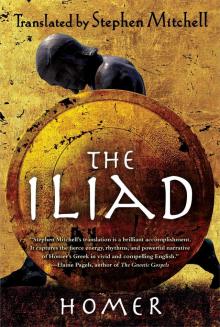 The Iliad
The Iliad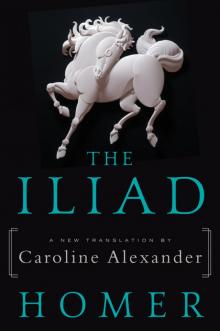 The Iliad (Trans. Caroline Alexander)
The Iliad (Trans. Caroline Alexander)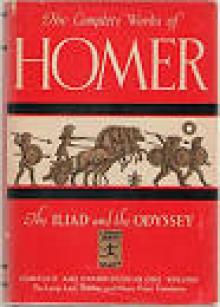 Complete Works of Homer
Complete Works of Homer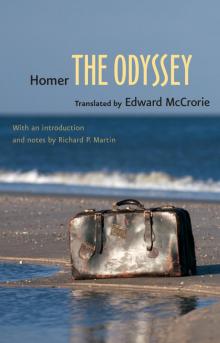 The <I>Odyssey</I>
The <I>Odyssey</I>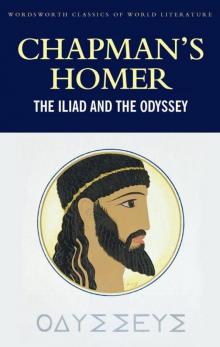 The Iliad and the Odyssey (Classics of World Literature)
The Iliad and the Odyssey (Classics of World Literature)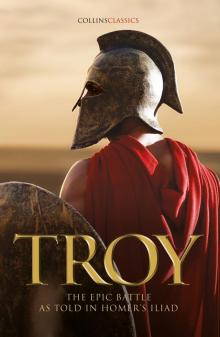 Troy
Troy The Iliad (Penguin Classics)
The Iliad (Penguin Classics)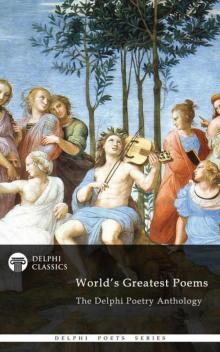 Delphi Poetry Anthology: The World's Greatest Poems (Delphi Poets Series Book 50)
Delphi Poetry Anthology: The World's Greatest Poems (Delphi Poets Series Book 50)